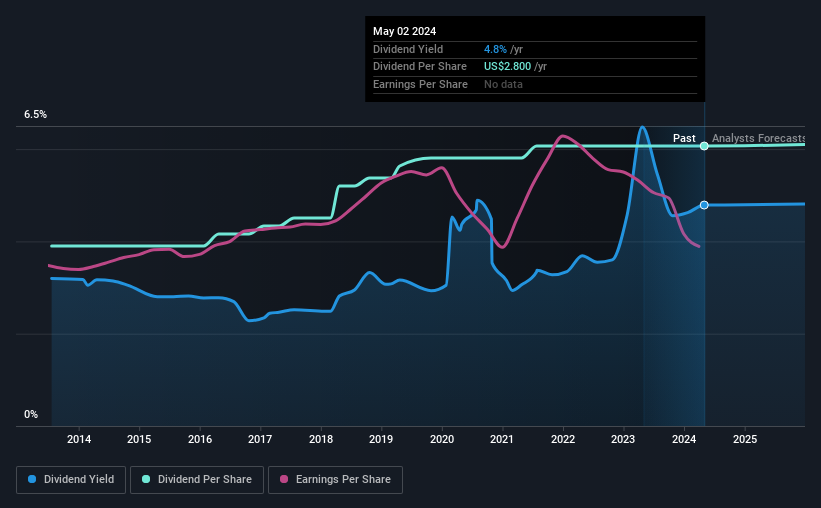Bank of Hawaii (NYSE:BOH) Will Pay A Dividend Of $0.70
Bank of Hawaii Corporation (NYSE:BOH) has announced that it will pay a dividend of $0.70 per share on the 14th of June. The dividend yield will be 4.8% based on this payment which is still above the industry average.
Check out our latest analysis for Bank of Hawaii
Bank of Hawaii's Earnings Will Easily Cover The Distributions
We like to see robust dividend yields, but that doesn't matter if the payment isn't sustainable.
Bank of Hawaii has a long history of paying out dividends, with its current track record at a minimum of 10 years. Based on Bank of Hawaii's last earnings report, the payout ratio is at a decent 72%, meaning that the company is able to pay out its dividend with a bit of room to spare.
Earnings per share is forecast to rise by 1.1% over the next year. If recent patterns in the dividend continues, the future payout ratio in 12 months could be 76% which is a bit high but can definitely be sustainable.
Bank of Hawaii Has A Solid Track Record
The company has a sustained record of paying dividends with very little fluctuation. The dividend has gone from an annual total of $1.80 in 2014 to the most recent total annual payment of $2.80. This implies that the company grew its distributions at a yearly rate of about 4.5% over that duration. While the consistency in the dividend payments is impressive, we think the relatively slow rate of growth is less attractive.
Dividend Growth Is Doubtful
Investors could be attracted to the stock based on the quality of its payment history. However, initial appearances might be deceiving. Over the past five years, it looks as though Bank of Hawaii's EPS has declined at around 6.6% a year. A modest decline in earnings isn't great, and it makes it quite unlikely that the dividend will grow in the future unless that trend can be reversed. Earnings are predicted to grow over the next year, but we would remain cautious until a track record of earnings growth is established.
In Summary
Overall, we don't think this company makes a great dividend stock, even though the dividend wasn't cut this year. The low payout ratio is a redeeming feature, but generally we are not too happy with the payments Bank of Hawaii has been making. We would probably look elsewhere for an income investment.
Companies possessing a stable dividend policy will likely enjoy greater investor interest than those suffering from a more inconsistent approach. Meanwhile, despite the importance of dividend payments, they are not the only factors our readers should know when assessing a company. For example, we've picked out 1 warning sign for Bank of Hawaii that investors should know about before committing capital to this stock. If you are a dividend investor, you might also want to look at our curated list of high yield dividend stocks.
Have feedback on this article? Concerned about the content? Get in touch with us directly. Alternatively, email editorial-team (at) simplywallst.com.
This article by Simply Wall St is general in nature. We provide commentary based on historical data and analyst forecasts only using an unbiased methodology and our articles are not intended to be financial advice. It does not constitute a recommendation to buy or sell any stock, and does not take account of your objectives, or your financial situation. We aim to bring you long-term focused analysis driven by fundamental data. Note that our analysis may not factor in the latest price-sensitive company announcements or qualitative material. Simply Wall St has no position in any stocks mentioned.

 Yahoo Finance
Yahoo Finance 
